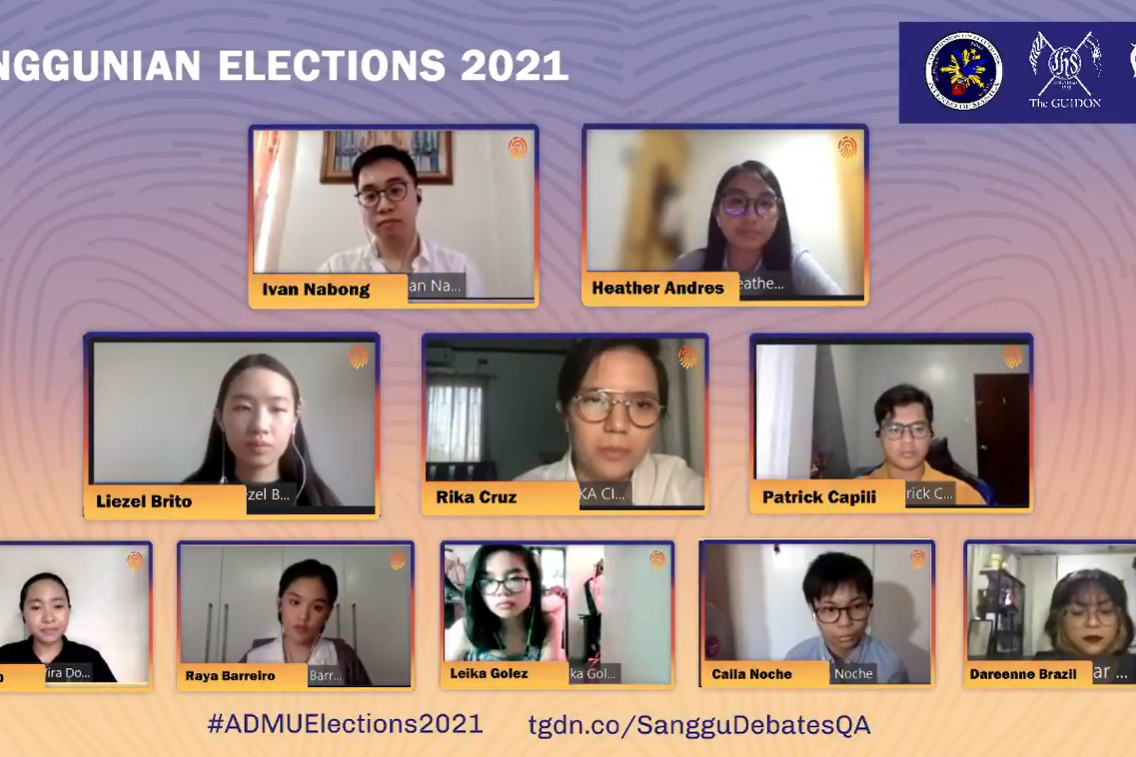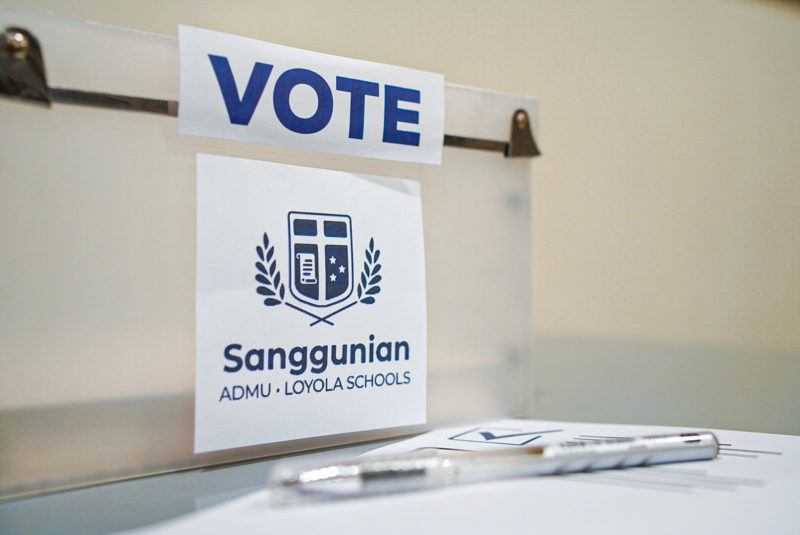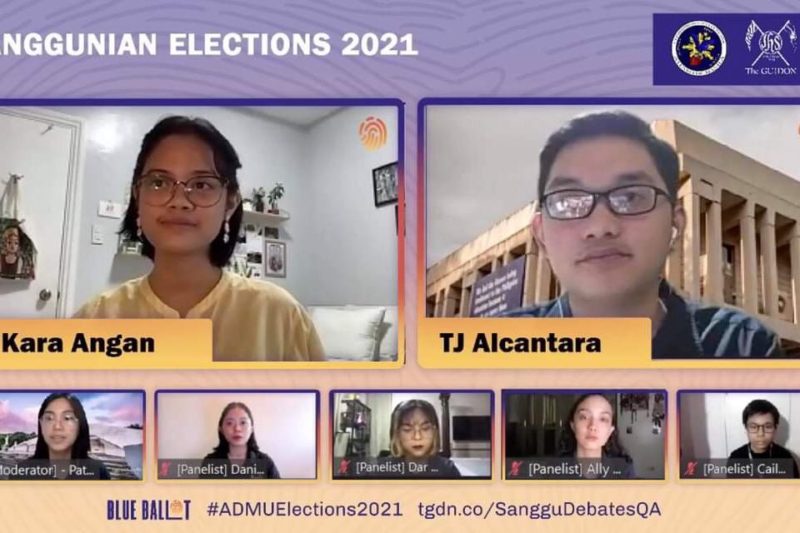INFORMATION DISSEMINATION, student welfare, and COVID-19 pandemic response were among the issues brought to fore at the first online Sanggunian debates on March 20.
The debates highlighted national and University-wide issues as the SR candidates answered a combination of online-pooled queries from the student body and questions from the host panelists from The GUIDON and Matanglawin.
Present at the debates were independent SR candidates Patrick Capili (3 AB IS) for the School of Humanities (SOH) and Liezel Brito (2 BS LM) for John Gokongwei School of Management (JGSOM). Also present were candidates from the RISE Coalition Rika Cruz (2 BS BIO) for the School of Science and Engineering and Ivan Nabong (2 AB DipIR), as well as Heather Andres from the SAMA-SAMA Atenista Coalition for the School of Social Sciences.
The 2021 Sanggunian SR Debates is the first part of the 2021 Sanggunian Debate series and marks the first Sanggunian General Elections since AY 2018-2019. Elections were cancelled in AY 2019-2020 due to the COVID-19 pandemic.
Involvement in national issues
The first round of the debate opened with a discussion on national issues, starting with a question for Capili on how the Ateneo student body can push for a better COVID-19 response. He emphasized that the University should listen to different recommendations from government agencies and private entities that offer aid by donating COVID-19 vaccines.
Panelist and The GUIDON’s News Editor Leika Golez asked Capili about his thoughts on the government’s COVID-19 vaccination program and the University’s involvement in these plans. Capili proposed that the student body should assess the “exact facts” of the national administration’s pandemic response.
Apart from discussions on the COVID-19 pandemic, questions regarding the red-tagging of student activists, drug criminalization, and campus press freedom were also raised.
Brito mentioned that she plans to use her platform for formalization and legislation that would help recognize campus journalists. However, when asked how campus journalists can maintain editorial independence should formalization happen, Brito reiterated her plans for legislation dedicated to strengthening campus journalists’ rights. She added that the Sanggunian can collaborate with the University administration and the student body to concretize and improve these.
“We will approach the [Loyola Schools] (LS) admin together as one, as a legislative body, and as students who freely express our voices and opinions,” Brito vowed.
In line with this, Andres was probed on their plans to tackle red-tagging and terror-tagging, to which they responded that the Ateneo Legal Services Center and the Ateneo Law School can provide protection for students. Since incumbent SOSS Representative TJ Alcantara is drafting the Socio-political Safeguarding Bill, Andres hopes to also pass a Safe Spaces Bill to protect freedom of expression.
Meanwhile, Nabong was asked how the Sanggunian can unite the Ateneo community and formulate a response to illegal drug use in the Philippines. He said that through dialogue regarding its criminalization, he hopes to engage the University administration and the student body in order to formulate a response grounded on a rehabilitation- and student sentiment-based approach.
When Nabong was questioned regarding his plans to ensure that the government would listen to Ateneans, he said that the student body should unify under one stance and have the University administration amplify the students’ voices. While Nabong did not expound further on his stance, he encouraged students to condemn the government’s violent approach to handling illegal drug use.
During the open forum segment of the debates, Panelist and Matanglawin Ateneo’s Katuwang na Patnugot Dar Brazil pressed Nabong about his stance regarding drug use in the Philippines, as well as how he will assert this to the University administration and the national government. In response, Nabong insisted on acknowledging the differing opinions of the LS community before making a stance and reiterated his previous call to denounce the war on drugs.
Following Nabong’s response, Cruz was asked how the Sanggunian can empower Ateneans to register as voters for the 2022 national elections. She mentioned that it is important to determine why people are apolitical or do not care to register.
“Bukod sa direktang pag-eencourage sa mga tao, ay alamin muna kung ano ba ang naghihinto sa kanila, ano ba ang reasons behind them being apathetic?” replied Cruz.
(Aside from directly encouraging people, we need to know what is stopping them. What are the reasons behind them being apathetic?)
To gather information on this, Cruz said she plans for SOSE Sanggunian to open communication lines for discourse by initiating quarterly online kamustahan sessions and other similar programs for students.
While she admits that online programs are challenging due to students’ varying levels of accessibility, she will do her best to push for more inclusive alternatives that will benefit all students. “Gagawin natin lahat ng hakbang para ma-reach ang mga students,” Cruz assured. (We will do all that we can to reach the students.)
Addressing University concerns
The second round of the debate tackled University-wide issues and kicked off with a question for Capili regarding the large allocation of subsidies received by Atenean theatre organizations versus other student organizations. He expressed his belief that Ateneo theatre organizations should be subsidized, and mentioned his goal to streamline the process of receiving subsidies.
Following this, Brito was asked about her concrete plans to aid unemployed John Gokongwei Student Enterprise Center workers. Brito said that she aims to institutionalize a bill that provides long-term aid, such as “skill-building and resume-refining” projects.
Meanwhile, Nabong was asked about his plans to improve the SOSS Sanggunian’s information dissemination strategies. Nabong briefly experienced internet connection issues prior to responding, but he was able to return to the event to note that students are unaware of the subsidies available to them. He mentioned plans to reassess the Sanggunian’s marketing approach by analyzing social media metrics, as well as conducting focus group discussions and individual consultations with stakeholders.
Golez then asked the SOSS Representative candidates on how they plan to simplify the processes in availing certain subsidies. Without providing specific plans, Nabong said that current subsidy processes must first be reviewed before revising protocols.
On the other hand, Andres had a different approach. Without delving into details on the program, they argued that there must first be a grasp on the students’ knowledge of subsidy processes. Brazil then prodded Andres and Nabong on how they would ensure that the students can access these subsidies when their circumstances—such as poor internet connectivity—prevent them from doing so.
In response, Andres discussed the possibility of using phone calls and service couriers to reach students better. They added that traditional banks can be used for subsidy deposit. Brazil asked Nabong once more on how he will ensure that students with connectivity issues can access the subsidies. Nabong responded by stating that he aims to collaborate with the LS-One website to reach students who have those particular issues.
On the issue of students’ learning experiences in the remote set-up, Cruz emphasized close communication between students and their home departments to guarantee that they are learning the necessary skills for their programs. Cruz also said that the SOSE Sanggunian hopes to initiate projects addressing psychosocial issues and concerns on health and safety protocols when they transition back on-site.
Open lines
During the open forum portion of the debates, Golez asked Cruz how she would ensure feasible safety protocols during the return to on-site classes. Cruz stated that the SOSE Sanggunian is ready to coordinate with the University and learn about the safety and health protocols to ensure a safe space for all Ateneans.
“Kaya natin makipagtulungan at maitaguyod na mismong yung structure at strategy ng Ateneo ay transparent sa mga estudyante,” said Cruz. (We can help and support each other to ensure that Ateneo’s structure and strategy are transparent with its students.)
Panelist and The GUIDON’s Photos Editor Raya Barreiro posed another question for the SOSS Representative candidates about creating a unified stance in the LS community. Nabong was the first to respond by citing that there are common Atenean values that can unite the different views of the LS community. He added that since the Ateneo is a Catholic institution, it must encourage the LS community to condemn “the violence of the State.”
With regard to students’ mental health concerns, Andres acknowledged the efforts of the University’s current mental healthcare programs and facilities. However, they stressed the importance of collaborating with student organizations that advocate for mental health.
Panelist and Matanglawin’s Punong Patnugot Caila Noche asked Capili about his plans to address the widespread mental health crisis felt by SOH students. Capili firmly stated that mental health is a pressing issue and hopes to find more proactive ways to assess the mental wellbeing of his constituents.
Golez asked all SR candidates about their plans in maximizing the Sanggunian Student Rights and Welfare Desks when students prefer to make anonymous posts online.
Brito answered first by indicating that JGSOM Sanggunian’s job is to inform students of the proper avenues to voice concerns. Similarly, Nabong wanted to redirect students to relevant resources and engage with the students via the comments of freedom wall posts. Andres, on the other hand, wished to directly reach out to the students that made those posts. Cruz shared similar sentiments with Andres by indicating her goal of making the Sanggunian feel more approachable.
Closing statements
After sharing their insights on the different pressing topics, each of the candidates delivered their own personal address to the Ateneo community.
With a fist raised in defiance to the culture of death and impunity, Andres asserts that they want to create a Sanggunian that relates and listens to students, especially the “vulnerable youth.”
Similarly, Brito reminded the audience of her goals to unite local businesses and the LS community, promising to follow through with their concerns, and to listen and stand with the students.
Meanwhile, Nabong reiterated how the Sanggunian must react decisively to represent the students to the best of its ability. He also vowed to draft policies that are relevant to SOSS students.
Capili asserted that he would love the opportunity to serve, and he is ensuring that he would have a better understanding as to how SOH Sanggu can help students.
Cruz stated that the Sanggunian is open to all. She asserts, “Tuluyang maparamdam at mabuksan ang SOSE Sanggunian sa lahat ng estudyante (SOSE Sanggunian should continue to open itself and make itself known to the student body).” She wishes that the SOSE Sanggunian will also be more involved in sociopolitical, medical, local, and international issues.
The second part of the Sanggunian Debate Series, the Presidential and Vice-Presidential Debate, will be livestreamed on The GUIDON’s Facebook page on March 27 from 5:00 to 8:00 PM.






